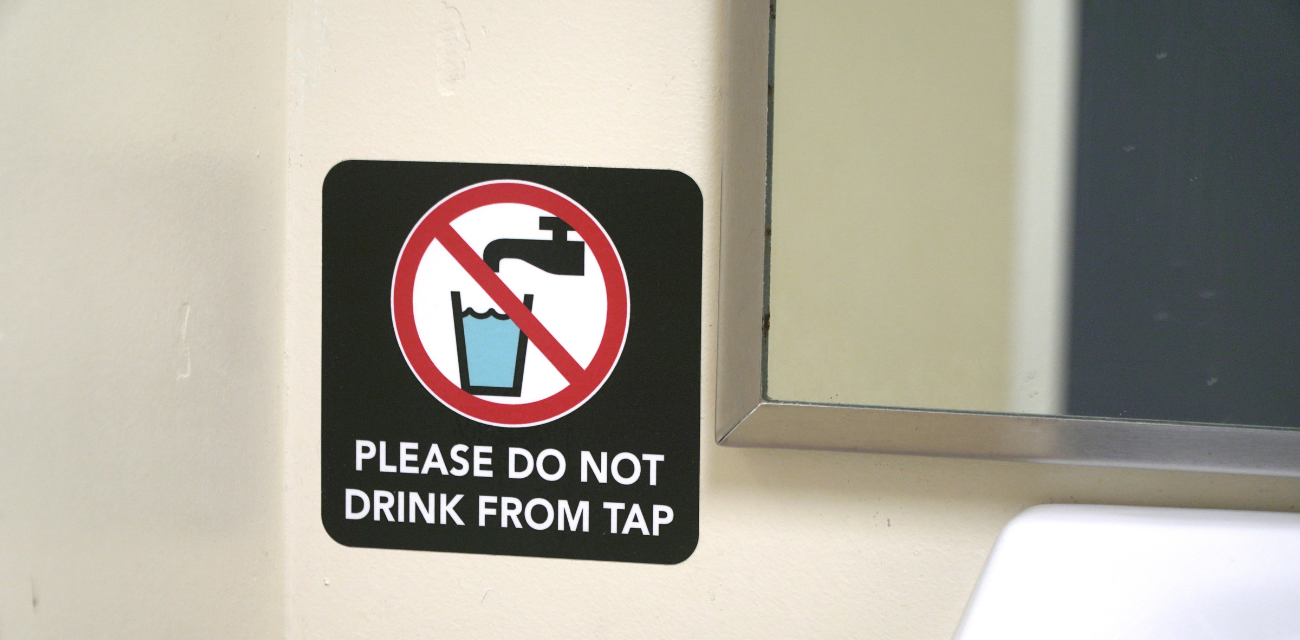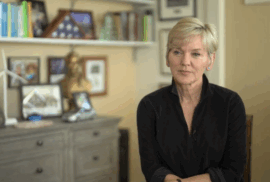Mona Hanna-Attisha: 2016 Milliken Award winner

Some pediatricians give kids a lollipop after a checkup. The deal’s a lot sweeter at Mona Hanna-Attisha’s clinic at Hurley Children’s Center in Flint. “Dr. Mona,” as she’s known around town, sends patients’ families out the door with a $10 voucher to buy fresh, healthy food at the Flint Farmers’ Market–no extra trip required, since the clinic is on the second floor of the market building. It’s also across the street from the bus station, providing an important connection in a city where 40 percent of residents live beneath the poverty line and many families don’t have a car.
It’s a setup that embodies Hanna-Attisha’s integrated approach to medicine and her belief that quality pediatric care can’t be separated from good nutrition and a healthy, stimulating environment. That prescription is needed more urgently than ever in a city whose children already faced daunting struggles before their drinking water was contaminated with toxic, brain-damaging lead.
It was Hanna-Attisha whose research exposed in 2015 that–despite government assurances that all was well–Flint residents were being poisoned by their tap water. Since the September day when she announced her findings, she has spoken out on behalf of the city’s children with the authority of a doctor and the passion of a parent. She has testified before Congress, spoken with countless journalists and appeared on TIME’s 100 Most Influential People list. Now she is leading an innovative public health program to give Flint children the tools they need to thrive.
A lifelong environmental advocate, an effective champion for the people of Flint and a model of what public service looks like, Hanna-Attisha is a more than worthy recipient of the Michigan Environmental Council’s Helen and William Milliken Distinguished Service Award.
“Mona quickly brushes off any praise of her courage and leadership, insisting that the spotlight stay on Flint’s children,” says Environmental Council President Chris Kolb, who met Hanna-Attisha through his service as co-chair of the governor-appointed Flint Water Advisory Task Force. “She is 100 percent committed to making sure the city and its people get the support and care they need for a bright future. Her selfless dedication is what makes Mona a real hero, even if she shies away from that word.”
‘You have to use your voice’
By now the story is familiar: After Flint, under a state-appointed emergency manager, switched to the Flint River as its drinking water source, residents began reporting foul-smelling and discolored tap water. Aware of those concerns and informed that the city might not be taking required steps to prevent corrosion, Hanna-Attisha ran a simple before-and-after analysis of hospital records, which revealed that children’s blood lead levels had doubled–or tripled, in some parts of the city–following the drinking water switch. She called a press conference to announce her findings, but state officials immediately tried to discredit her announcement in the media as “irresponsible” and “near hysteria.” A week later, they acknowledged that Hanna-Attisha’s findings were accurate–that, in the middle of the Great Lakes, an entire city’s drinking water had been poisoned.
To Hanna-Attisha, speaking out on behalf of Flint’s kids and urging policymakers to invest in their futures goes hand-in-hand with her job as a pediatrician.
“You have to use your voice, because kids can’t vote,” she says. “As pediatricians, it is our job to speak for children. I was just doing my job.”
Now, the job is to give Flint kids the best possible chance to avoid or overcome the well-documented cognitive impacts of lead exposure–attention problems, lowered IQ and aggressive behavior, to name a few–and have successful, fulfilling lives.
To that end, Hanna-Attisha is leading the Pediatric Public Health Initiative, a joint effort by Michigan State University, where she’s assistant professor of pediatrics in the College of Human Medicine, and Hurley Children’s Hospital, where she directs the pediatric residency program. The initiative brings together a wide range of experts to address the city’s population-wide lead exposure from multiple fronts, and provides the tools for the assessment, continued research and monitoring, and interventions necessary for improving children’s health and development.
“No, we can’t take this away,” she says of lead’s impacts. “It is irreversible. But we cannot sit back and do nothing for these children. We are trying to be proactive and trying to do what hasn’t been done before by building these support systems.”
Hanna-Attisha also is part of the Flint Interagency Coordinating Committee, a panel of experts, state officials and local leaders appointed by Gov. Rick Snyder to work on long-term solutions to the drinking water crisis and ongoing public health concerns affecting residents.
And she was the founding donor to the Flint Child Health and Development Fund, launched by the Community Foundation of Greater Flint to provide pediatric care, nutrition education, healthy food access and other programs as a supplement to state and federal government investments. The fund has so far raised about $7 million, and the Flint-based Charles Stewart Mott Foundation recently pledged a dollar-for-dollar match, up to $5 million, for donations to the fund through 2016.
A long-term commitment
The water crisis may have launched Hanna-Attisha into the public eye, but she was already a familiar face in Flint. As a medical student at MSU, she did her clinical training in the city and learned firsthand about the challenges facing its families. After completing her residency at the Children’s Hospital of Michigan in Detroit, earning a master’s degree from the University of Michigan School of Public Health and teaching in Wayne State University’s Department of Pediatrics, Hanna-Attisha returned to Flint in 2011 for the position at Hurley.
“The way that she’s been a champion for the children of Flint, watching her do that is such a great thing to see, and it’s not a new thing,” says longtime friend Elin Betanzo. “Her work and her commitment to that community is a long-term thing.”
Hanna-Attisha’s friendship with Betanzo played an important role in uncovering the lead crisis in Flint. A water engineer who worked for the U.S. Environmental Protection Agency when Washington, D.C., had its own lead-in-water crisis caused by pipe corrosion, Betanzo became concerned when she learned at a conference that Flint was switching to the river for its drinking water. Her worry deepened when she heard reports of corrosion issues and lead-contaminated water in Flint homes. Then, at a dinner party at Hanna-Attisha’s house, it occurred to Betanzo that her friend had access to hospital data that could indicate if Flint kids were showing higher blood levels since the switch. She mentioned it at the party and emailed some information that night. Hanna-Attisha got started on the study the next day.
Moments before she took to the press conference podium to announce her findings, Hanna-Attisha texted her friend, “I think I’m gonna throw up.” Betanzo replied, “You got this.”
The courage and leadership Hanna-Attisha has shown came as no surprise to Betanzo, who has known her since they met as freshmen at Kimball High School in Royal Oak. “In a lot of ways she was just another 9th grade kid, but I think I knew right away she wasn’t just average,” Betanzo says, describing Hanna-Attisha as a high academic achiever who moved freely among social circles and got along well with everyone.
As members of a student environmental club, the friends were part of a campaign that shut down a trash incinerator in Madison Heights whose pollution contributed to asthma and other respiratory problems for nearby residents. The success was empowering and ignited Hanna-Attisha’s passion for activism. “Going to protests, wearing a lot of tie dye, that was my thing,” she says.
Her activism continued when she went to the University of Michigan. She led voter registration drives, organized an alternative spring break service effort and represented the student body on a committee that established a campus-wide environmental theme semester. And as an undergraduate in U-M’s School of Natural Resources and Environment, Hanna-Attisha carved out her own honors concentration in environmental health. She was a research assistant with Rita Loch-Caruso, a professor in the School of Public Health, and published research on how PCBs affect pregnancy. She also studied under 2008 Milliken Award recipient Bunyan Bryant, a Flint native and U-M professor who created the university’s Environmental Justice program and is recognized as a pioneer in that field.
“So I learned about environmental justice from, like, the guy,” she says. “I was prepared to address this issue because everything in my past had trained me to be cognizant of the role of the environment in health, which prompted me to go to medical school.”
Origin story
Hanna-Attisha was born to Iraqi parents in England, where her father was earning a Ph.D. in metallurgy. Their plans to return to Iraq were disrupted by Saddam Hussein’s rise to power, and they instead moved to Houghton, where her father found postdoctoral work at Michigan Tech. (“I just remember the ice sculptures and my dad skiing to the college,” she says.) They later moved to Royal Oak, where her father worked for General Motors and her mother was a teacher.
Letters from her relatives in Iraq offered terrifying glimpses of life there. Others were redacted by the regime. Growing up aware of what was happening in her parents’ homeland fueled Hanna-Attisha’s early beginnings in activism.
“We came to this country for freedom,” she says. “Where we were from was riddled with injustice and fear and tyranny. I was raised recognizing that the world is not all apple pie, and also cognizant that injustices were everywhere. And I think that’s probably my origin story, why I’ve always tried to fight for justice and equality–because I know the consequences of not having that.”
With the Flint crisis in mind, Hanna-Attisha urges fellow Michiganders to exercise their right–she might call it a duty–to educate themselves, get involved in causes that matter and protest injustices.”I wasn’t naМшve to start with, but I trusted the water that came out of my tap,” she says. “I have completely lost trust in the agencies that are supposed to protect us. So I would encourage people to keep holding those agencies accountable.”
Just a speed bump
Things have slowed down a bit for Hanna-Attisha since the early days of the Flint crisis, when her calendar became absurdly packed with media interviews, meetings with high-ranking officials, patient visits, speaking engagements and town-hall meetings. Now there’s a bit more time to spend at her West Bloomfield home, doing her other important job: mom to two daughters, Nina, 10, and Layla, 7. “Whenever I have time, I want to spend it with family,” she says. The girls are bright enough to grasp that it’s urgent work that has kept her away so much these past few months. They’re also sharp enough to notice their mother’s guilt about not being home more and turn it into a new pet cat.
Her husband, Elliott Attisha, is also a pediatrician who delivers care to Detroit children with a mobile clinic that visits city schools and community centers. He also happens to be allergic to cats. “So we’re medicating him,” Hanna-Attisha adds with a chuckle.
Still, her schedule remains demanding. There was plenty of work to do in Flint before the water crisis struck. Now the challenges have grown considerably, with no end in sight. But Hanna-Attisha says that’s what she signed up for. Caring for patients, educating parents, testifying before committees, raising money–it’s all part of a pediatrician’s job, as she sees it.
And she’s hopeful for the future.
“We are not going to be defined by this crisis,” she says. “We will be defined by what we do after this crisis. Before the water thing happened, Flint was on a rebound. And the water crisis is just a speed bump. We are using this as an opportunity and the community is coming together like it’s never come together.”
Discover
Power environmental change today.
Your gift to the Michigan Environmental Council is a powerful investment in the air we breathe, our water and the places we love.
Sign up for environmental news & stories.
"*" indicates required fields




